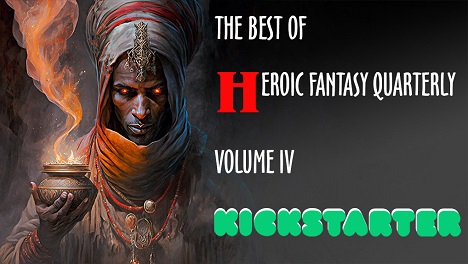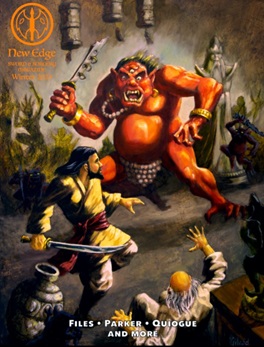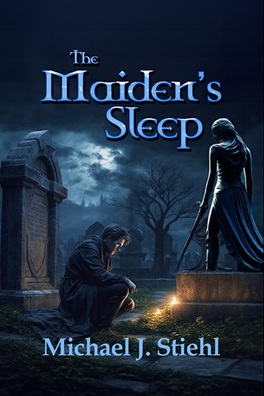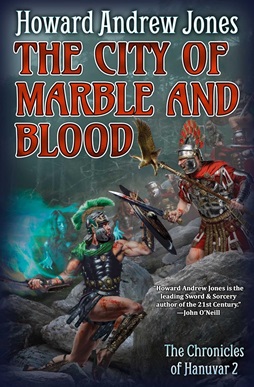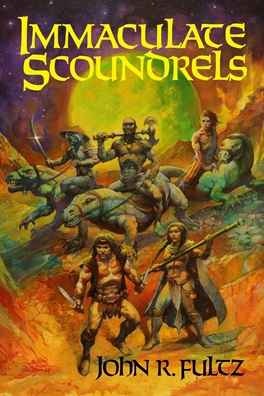THOKMAY
THOKMAY, by Dennis Mombauer
Up ahead, the monastery rose into the snow-veiled sky, a solid shape amidst the whirling whiteness. Thokmay, Ngari und Dorje had wrapped themselves in layers of fur-lined cowls, but the cold still crept in, rasped over their skin and made their bones feel brittle.
“Thokmay, our most promising pupil.” The high priest stared down on him with ancient, near-blind eyes, the pouches beneath them billowing like cauldrons of flesh. “To conclude your tuition here in Kyunglung, we need you to do something for us: to prove your worth, your skill, your determination.”
The mountain path led them around a formation of jagged rocks, icicles hanging down in frozen candelabra. The monastery had gotten out of sight again, but it couldn’t be far now, not according to the villagers’ description.
They had told them that a stranger with two albino yaks had passed through, packsaddles laden with scrolls and prayer chains, his eyes the red of heart-meat, pointed solely at the monastery on the mountain’s higher slopes. The monks living there prayed for the villagers’ souls and hoarded their secrets: like all monks, they turned lives into texts, thoughts into mere symbols.
“One of our own has turned against us, fled us, and he has taken something valuable with him.” The high priest’s mouth was hidden underneath a yellow scarf. “Go to the monastery of Dobzha, young Thokmay, find the outcast and bring back our treasure: but do not touch it. Do not listen to him, do not reason with him, do not fall under him.”
The monastery gates were four times Thokmay’s height, immense wooden wings with metal fittings. Prayer flags flapped in the snowy gusts, and the only lamps were lit behind the upper windows, where the building narrowed along the mountain.
Thokmay approached the gates and put one hand on the petrified wood. His companions closed up to him, watching the surrounding landscape with wary eyes, their swords secured in the sheaths on their backs.
“We need to get in. Is there any other way?”
“Maybe it’s unlocked. Otherwise, I think I could scale the walls.” Ngari had grown up the adopted son of a mountain guide and could climb excellently, although he was even younger than Thokmay himself, sixteen summers and fifteen winters.
“This is dangerous. I don’t think we should split up.” Thokmay pulled back from the gate, and in the same instant, it collapsed inward in an avalanche of splinters and crashing metal, as if he had ripped it from its angles with the force of a battering ram. The sound echoed from the hills and through the vaulted darkness behind the gate, and Thokmay flinched under its loudness.
“You must be wary, young Thokmay, wary to shield yourself against the outcast and his powers. You are a promising pupil, but so was he once, privy to the faceless secrets of our kind: and while his strength has faded, he is still dangerous.”
Thokmay and his companions entered the monastery, peering into the shadows. The light from outside reached only a few feet before it faltered, so Thokmay ignited a lantern and held it out, trying to see more.
#
The room was vast, but it wasn’t empty: the lantern-light peeled bodies from the gloom, sprawled on the floor, their cowls tattered, their faces eaten off.
“Careful.” Thokmay wandered further inside while his companions followed with drawn swords, their movements echoing from the ceiling arches. Stairs led up into the monastery’s higher levels, the worn-out steps stained with crystalized blood, while all the doors on the ground floor had been broken down by force.
“Who did this?” Thokmay’s voice sounded strained to him, while Ngari’s and Dorje’s features could have been sculpted from stone. Dorje had always been a fearless boy, wandering out at night when the stars hid behind the mountains and the winds hungered for heart-meat; Ngari didn’t seem to really notice the dead.
“Whoever it was, we will find him. I am becoming a priest of Kyunglung, and you are soldiers: come on.”
Thokmay moved toward the stairs, then tensed in place. As he blinked, attackers swarmed around him, hunched soldiers whose blades hacked down in sharp flashes. They were afterimages rather than living matter, and Thokmay concentrated on his own breathing and heartbeat, observing a battle that raged in flickering images like a spinning zoetrope.
The ghostly soldiers lunged forward, buried filed teeth in necks and cheeks, threw their victims to the ground and slaughtered them in fierce combat. The monks fought back, surrounded by attackers who vanished with Thokmay’s next blink. He caught a glimpse of the figure leading them, its head eyeless and washed-out, with a mouth full of glistening fangs–then, the hall turned back into a hushed tomb.
“What did he steal, exalted one?”
“It’s good that you pose this question, but a mistake to pose it to me.” The high priest stared at Thokmay with yellowed eyes. “The outcast took a mask of streaked ivory, a crude and corrupted thing, a perversion of nature: an artifact that needs to be locked away. Do not put it on before I have prepared you, or it will mark you, drain your soul, wash out your flesh until only scars remain.”
“Everything alright, Thok? What is it?”
“A presence. The man we are hunting.” Thokmay tried to pick up a scent using the training he had received in the halls of Kyunglung: but there was nothing except the slowly fluttering snow, the stones of the monastery shivering against each other, the walls aching under their own weight.
“Look.” Dorje appeared from a side wing of the entrance hall, smelling of old hay and musk.
Two yaks were standing there, nose rings tied to the wall, their massive bodies huddled together against the cold. Their fur was pale and shaggy, their eyes unsettled like smoldering coals.
“The packsaddles are still full,” Dorje observed, “laden with all sorts of things.”
“Don’t touch them. Let me see.” Thokmay covered the distance with a couple of quick steps and rummaged through the bags, feeling the yaks breathing like giant bellows. He found a smooth oval shape and pulled out a mask with white skin, its eyes non-existent, its mouth full of digging teeth.
“This is what we were sent here for, isn’t it?” Ngari stood next to Thokmay, glancing over his shoulder. “We should return it to Kyunglung.”
“Bear in mind that you know nothing about power, not yet. We brought you here from less-than-oblivion, from amidst-the-worms: and we are building you up to become a priest, a student of our philosophy of duality and darkness. There are two parts to everything, and we aspire to cut off the shadows and reveal the crystal, to follow the path of enigmas. But you are still a worm, young Thokmay: and if you betray us, we will squash you.”
“Yes.” Thokmay wrapped the mask with slow motions and put it away, close to his body. “But first, we need to find the one who stole this. It’s not enough to return the mask, not if I want to impress the high priest.”
Thokmay’s eyes wandered along the shivering walls and vaulted arches, thinking back to Kyunglung, where even the light was callous, where everything was scheming and the great well-shafts echoed with deathless voices.
He remembered the day the priests had come to his village, their faces veiled by yellow scarfs, their hand-maws giving orders. They had arrayed all the boys in one line, and they had pointed at Thokmay to be taken and trained at their monastery-fortress, far away from home. He could barely remember his family, as if his childhood had taken place behind a shroud, in another world he couldn’t glimpse anymore.
The high priest in his saffron robe stared at the village children, flanked by soldiers with carnivoran teeth. “This is good, very delicate. One of you shows promise, at the very least. You there, tell me, what’s your name?”
“Our quarry must have come here for some reason, to find or to do something.” Thokmay turned his head, trying to shake off the cobwebs of old memory: “Let’s go upstairs, climb the tower and look for the abbot’s quarters.”
#
“What are you doing here?”
Thokmay and his companions ascended the stairs but were blocked by a group of monks in brown robes–and as Thokmay looked around, he saw that the corpses had disappeared, the gate closed, the lanterns in the hall lit.
“How did you enter? What do you want?”
The air was no longer crisp but heavy with the warmth of fires, incense sticks and living bodies. Shadows twisted along the walls like incorporeal messengers, and the monks stared at Thokmay with hostile eyes, their bald heads glistening.
“My name is Thokmay, and these are my companions.” Thokmay tried to summon all the dignity of a high priest. “I have been sent by the high priest Yongten, and I need to speak to your abbot. Can you take me to him?”
“Of course, of course.” The monks bowed, a little too brisk and high. “Tell your companions to put away their swords: there are no dangers here in Dobzha to defend against.”
“I see.” Thokmay watched Ngari and Dorje sheath their weapons. “Now take me to your abbot.”
“Follow us.” They reached the monastery’s third level and exited the staircase into a colonnade overlooking an interior courtyard. “The abbot’s tower is this way.”
Between one blink and the next–nothing more than a half-heartbeat of closed lids–the monks vanished. Stones crumbled before Thokmay, and he suddenly heard the wind howling again, forcing its way in through broken shutters and fresh cracks in the walls.
“These two soldiers, whom we took from the dirt, will escort you, young Thokmay: but do not get attached to them, for they possess no promise, nothing that will gave value to their lives. They have no dual nature, no crystal core and no teeth: like you, they are worms, and unlike you, they have no chance to change this.”
Vultures circled over the balconies and upper terraces of Dobzha, appearing from the whirling snow and vanishing again. Two men had been stretched with ropes outside, hanging in the air, exsanguinating from slit throats–and Thokmay glimpsed a masked figure below them, staring without eyes, a featureless blur of a face.
There was something vaguely familiar about the two corpses, maybe the way they had been put up there, a warning or an example … it was the sort of thing high priest Yongten would do, the sort of thing Thokmay might one day do himself.
Behind some of the monastery’s windows, Thokmay saw soldiers with filed teeth and scarred heads, searching the building for survivors.
“Come on.” Thokmay hurried over the wooden floorboards and along the corridors honeycombing the monastery’s outer walls, followed by Ngari und Dorje. They crossed a chamber open to the elements on one side, and Thokmay heard the attackers’ rough shouts in the distance.
Slaughtered yaks hung from iron hooks here, their flayed meat steaming in the cold –but Thokmay had no interest in their rich protein. He found another stairwell leading up, spiraling toward the highest point of Dobzha, the abbot’s tower.
“Ngari, Dorje, wait here and keep watch. I will see what’s inside.”
#
“You must be the emissary from Kyunglung.” A man in an abbot’s robe was sitting behind a low table, steam rising from a cup of broad-leafed tea. “The high priest told me you would come, back when he first arrived.”
“The high priest is here?”
“Certainly. He arrived nine days ago, and we have afforded him every hospitality.” There was something off about the abbot, something slithering in his voice, his skin freckled like salt meat.
“The man you are harboring is not the high priest, but an outcast. I’m here to bring him back to Kyunglung. You must hand him over.”
“Oh, but he is a high priest, just not yet, not yours, not completely. Do you even know why you have been sent here?”
“I’m here to bring back this outcast, and you need to hand him over.”
“Why? Why does he need to go back to Kyunglung, why do you need to bring him there? There are two parts to everything: we have a right and a left heart, two lungs, two eyes, two ears. Our souls are divided into a crystal and a shadow–and between them, only meat.”
“I’m not taking teachings from you. Where is he?”
“There is no outcast, only you and me. Leave now, and everything can still be mended, your soul patched, your wounds sutured. Take your friends and walk away … Kyunglung is not the only path for you.” The abbot sipped from his tea. “But if you insist on staying, you will die here, and your friends will die, so very far from home.”
“You have no idea where my home is. You don’t know me.”
“But I have been told a great deal, secrets that you may not realize yourself.”
“Do not listen to the outcast, young Thokmay, do not reason with him, do not fall under him. He communicates in mazes and mandalas–don’t trust too easily in the reality of what you see. The veils are permeable within the walls of a monastery, swaying with long voices; and the outcast might try to mislead you.”
“Tell me where the outcast is.” Thokmay drew his curved knife and advanced toward the abbot. “Now!”
“He is here, in Dobzha, but I can’t hand him over. You are not a high priest yet, not even a low priest. I’m the abbot of Dobzha, and I will not be threatened by you.” The abbot stood up and put his bald head directly in front of Thokmay, leaning over the table. “I will have you thrown in a cell until you regain your composure.”
“Do not stay in Dobzha too long, or I will assume that you have been turned, that you have fallen, that you now pray to the outcast. I will send someone else, and then another, until one of you returns our treasure. It is important: everything else is not. Bring it to me, and you will be rewarded.”
Thokmay’s knife sliced down, deep into the abbot’s flesh, cleaving it like a butcher cleaved raw beef, like the flayed yak carcasses would be cleaved when it was time to dine. He yanked the blade free, covered in red strings, and hacked down again.
“Thok! What are you doing?” Ngari entered the room and sprinted toward Thokmay while Dorje stood in the door, his eyes betraying no emotion.
Armed monks rushed in, overwhelmed Dorje and then Ngari before throwing themselves at Thokmay. They swarmed around him and wrestled the knife from his hand, then pinned him down. The monks carried the blood-covered abbot away while they shackled Thokmay: and then, they dragged Thokmay into the depths of Dobzha.
#
The cell was cramped and bleak, one side blocked by iron bars, the others by jagged mountain bedrock. There were no guards posted outside, and none were necessary: there was no possible way to flee from this prison.
Thokmay turned the mask in his hands, caressing the polished ivory, feeling rough ridges where streaks ran over the brow and cheeks. It was hard and heavy, but it didn’t feel uncomfortable, just … foreign.
“Have you put it on? Show me your skin.” The yellow voids of the high priest’s eyes filled Thokmay’s field of vision, plunging him into freezing wells of resin, solidifying to amber until he couldn’t move a muscle. “If you have, I will eat your spicy little heart, I will feast on you, consume you: did you put the mask on? Did you try it out, feel its ivory against your skin, its spikes pierce into your mind?”
Thokmay carefully put the mask away again and began to shout, for some kind of help, anyone.
He walked along the walls, testing them for weaknesses, some structural flaw, but could find nothing. He closed his eyes and tried to meditate, to feel something beyond the trembling stones, beyond the corridor that led out from the cell tract.
“Is anyone there?”
“Yes, we are here.” Dorje sneaked around the corner, his face covered in bruises. “We have the key, Thok, come on. The monks are coming! We need to get out, no time to search for the outcast.”
Suddenly, the iron bars bent outwards in a sharp snap, as if they had been pulled by ropes with great force. Rubble littered the floor, and Thokmay saw the bodies of monks, their faces turned into red ice and bones. It was cold, and snowflakes drifted down the corridor, forming white heaps on the ground.
Thokmay climbed out hastily, scratching his arm in the process but barely registering the pain. Where did Ngari and Dorje go? Should he search for them? Dobzha had to be swarming with monks … and he had another priority, a mission from high priest Yongten himself.
He followed the corridor until he reached the vaulted entrance hall, then froze as he saw the masked figure again, its eyeless ivory grimace turned toward him. The thing was no taller than Thokmay, but it was hard to look at, a grotesque blank face hovering on top an ordinary pair of shoulders.
The mask-wearer slowly walked toward the hole where a side gate had been–twisted and shattered now–, showing no reaction to Thokmay. He stepped through and vanished out of sight: and when Thokmay reached the passage, he could only see stairs winding down, illuminated by crystals within the rock.
#
The catacombs of Dobzha were vast caverns that stretched into blue-tinged darkness, dotted with engraved mosaics and alcoves containing mummified corpses.
At the bottom of the stairs, a path led toward a stone pedestal rising from the ground: and on the pedestal, a well-preserved mummy sat in meditation pose, its face and skin covered in brown bandages, impervious to the bone-chilling cold.
“I’ve seen you go in here! Where are you?” The masked figure had vanished again, but when Thokmay listened closely, he could hear breathing, reflected back dozenfold from the cavern walls. Where did it come from? Thokmay turned around himself and came to a halt facing the mummy on its pedestal.
The bandages were wrapped around the face too tightly to hide a mask, and they left open dark slits for the eyes … but there was life in this thing, Thokmay could sense that.
“I know that you are not dead. Are you the outcast? Why are you here?” Thokmay approached slowly, listening for other sounds from the remote areas of the cavern. “I am Thokmay, and I have been sent here by the elders of Kyunglung.”
The mummy opened its eyes, lush orbs the color of heart-meat: and it stared at him.
A corridor with pale walls, their teeth grinding against each other, producing a crunching noise. A junction, then another. Crossroads everywhere. He takes them, his shadow gliding over the teeth, sinking into them, being bitten, chewed, cut into pieces. A dead end, yellow globs drooling from its lips, glistening. Between them: a face, his face. He looks more closely, the teeth falling silent: is it truly his face? It has gotten so dark …
“What are you showing me? What is this?” Thokmay called to mind the words of the high priest and shielded himself against the onslaught of images. He wishes he still had his knife, some kind of weapon to threaten this thing with. “Don’t think you can distract me. You are the outcast, aren’t you? I’m here to return you to Kyunglung!”
The teeth gnash. The walls rise, white as year-old snow, rusting away in melichrous streaks. He has gazed into his reflection, and he has found something lost, something bloody. He runs, and his reflection runs as well: but the paths of the labyrinth always lead them toward each other.
“Come with me. There is no other way.”
He walks through pallid maws that oozed on him, biting down. They drive into him, breaking him up, dismembering his flesh–but they also suck out his pain, until he doesn’t hurt anymore. His chewed-up remains merge back together, turning him into a tapestry of sutures: and he falls.
“I don’t care. I can’t go back empty-handed. Here: this is what you have stolen, the crime you have committed. I don’t know what you are doing, why I keep seeing you run around with it: but this is the mask I found on your yaks, and I will return it to high priest Yongten.”
The teeth bite.
Pain rushed through Thokmay, bloomed from his scratched arm and a dozen bruises on his body, proliferating along his arteries, filling them with thorny vines.
The teeth chew and scrunch.
He tried to fight it, but the thorns pricked his skin from within, pierced through it, shot outward in white-hot needles. He broke down to his knees, doubling over, clasping at his own flesh while agony washed over him. With every breath, tense muscles seemed to tear, bones to snap, joints to dislocate within a torture chamber of rising thorns.
“Why did you steal the mask? Why did you come here?” The voice sounded similar to Thokmay’s own, but it was distorted and came from upstairs, heavy with a similar kind of pain.
Thokmay felt his strength resurge, stemming against the mummy’s illusions, erecting barriers, enduring. If he could leave this cavern, he would be able to get away, to escape with the mask to Kyunglung, to get help.
They spit him out.
Thokmay turned toward the stairs and watched the masked figure descend, while he still kneeled on the ground, unable to speak. Blood rushed through his veins again and flushed the brambles out, but each heartbeat brought forth a thousand tiny cuts.
“Because of you, I suffered. You will die now, die by my hand.” The mask-bearer did not look at Thokmay but at something behind his back.
Suddenly, Thokmay felt a touch, a hand on his shoulder, bandages rustling to the ground, revealing skin that wasn’t leathery or rotten at all: and he ran.
#
“You have earned our trust, young Thokmay. You brought us back our treasure; you returned from your errant without fail. We will reward you: we will give you an army to lead, and you will make an example of Dobzha. Raze the monastery that provided refuge to the outcast, and put its monks to the sword.”
Snow drifted over the pass, almost camouflaging the soldiers marching up in the distance. Thokmay watched his army from a formation of rocks and tried to make out Ngari and Dorje: but there were simply too many men, bleeding into each other in a palette of white and grey.
He remembered: they couldn’t be here because he had left them behind, because he had fled Dobzha’s horrors without them. But he had returned now, with all the might of Kyunglung: and he would find them.
Thokmay put on the mask, its fangs fitting perfectly over his own pointy-filed teeth, and began to climb down from his vantage pint.
“What about the outcast?”
“We serve That-Which-Cannot-Be-Gazed-Upon, Thokmay, the darkness that is ourselves. We hunt our shadows, over and over again, masked with strange faces: and when we confront them, we do not lose ourselves. This is what gives us strength, young acolyte: this is what you must learn. If you find him, kill him. There is no need to bring him back this time.”
The monastery’s gates broke down under the brutal force of the battering rams, and Thokmay’s army stormed in, slaughtering all resistance under its feral onslaught.
Thokmay walked behind them, stepping into an entrance hall whose shadows crawled away screaming, the silence mangled by hacking and flesh-work.
A monk was lying on the ground, right next to another, and more: Thokmay strode through a battlefield of tangled corpses. Swords and knives stuck out from stiffening flesh, blood still accumulating in shallow puddles, the edges freezing over in miniature banks of fog.
“Exalted one.” A soldier approached, out of breath. “We have found two of our own upstairs, on the terraces. The monks … executed them.”
The mask had no openings for Thokmay’s eyes, but he could see sharper than ever before, as if a shroud had been lifted. Everywhere around him, doors were being destroyed and tapestries torn down: and without hesitation, he walked toward the stairs to the catacombs. Nothing to be done about Ngari’s and Dorje’s strung-up bodies, only a task to fulfill.
Glowing crystals within the rock provided a bright and steady light for him, submerging the expansive caverns in a sharp luminosity that left no room for darkness. The mummified figure was sitting on its pedestal as Thokmay reached the last step, its open eyes defiantly pointed toward him.
“Why did you steal the mask? Why did you come here?” Thokmay face the mummy and slowly stepped toward it. “Because of you, I suffered. You will die now, die by my hand.”
The teeth bite. The teeth chew and scrunch. They spit him out. Is it his face anymore? What has he done to it? He runs, and his reflection runs as well: but the paths of the labyrinth always lead them toward each other.
The mummy stood, and its bandages rustled to the ground, revealing skin that wasn’t leathery or rotten but covered in a horrifying tapestry of scars. There was a living person under it, with arms and hands and legs: with a heart beating in its chest, with a familiar face.
Hungry yellow eyes stared at the boys, who held their heads upright, struggling to return the high priest’s gaze. The monastery high on the mountain loomed in the background, small enough to be grasped in one hand but so far away that only a bird could reach it.
“You there, tell me, what’s your name?”
“Thokmay.”
“Who are you?” The man underneath the bandages was disfigured, but there was something in him that Thokmay recognized, some long-buried memory that clawed its way back up. “What happened to you?”
“Do not put it on before I have prepared you, or it will mark you, drain your soul, wash out your flesh until only scars remain.”
The unwrapped mummy didn’t speak, but Thokmay saw flashes of gnawing teeth again, a wave of pain that broke against the streaked ivory of his mask. “You came here from Kyunglung, and you stayed … why? You knew I would return. I would have to return.”
Thokmay still took in the sight of this marked man, no older than him, mutilated and drained, unable to incite his vocal cords to actual speech. “Why did you steal the mask? Why did you come here?”
Ngari’s and Dorje’s faces floated before Thokmay, crushed by falling teeth and ground into melichrous pulp that mixed with the abbot’s spluttering blood.
“Why did you make me go through this?”
“We serve That-Which-Cannot-Be-Gazed-Upon, Thokmay, the darkness that is ourselves. We hunt our shadows, over and over again, masked with strange faces: and when we confront them, we do not lose ourselves.”
Thokmay drew his curved knife and advanced toward the remains of himself.
“You are but a shadow, but I am strong, I have a crystal core.” The mask rested comfortably on Thokmay’s skin, merging with him in places, thirstily licking up all sweat as soon as it left his pores. “I will cut off the shadow and reveal the crystal: and there will be only one of us left.”
___________________________________________________
DENNIS MOMBAUER, Born in 1984 in the namesake capital of the Bonn Republic & raised along the Rhine river. Currently lives & works as a theatre agent & freelance author in Cologne. Writes weird fiction, textual experiments & literary essays as well as non-naturalist drama & English poetry acculturated with German. Translates both fiction & non-fiction. Editor, co-founder & -publisher of Die Novelle – Magazine for Experimentalism“. Publications in various small- to medium-sized magazines & anthologies.
